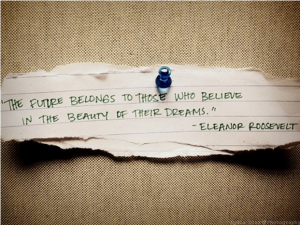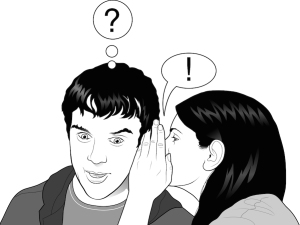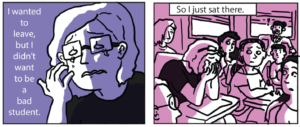
Source: Laced with Joy
It’s true. Women’s rights in the United States have come a long way, as illustrated by a recent Ms. Blog piece about the 10 things that American women could not do before the 1970s.
And it was amazing.
But as we reflect on the remarkable progress the feminist movement has made in creating a more just and equal society — nationally and globally, culturally and politically — I challenge us to also look ahead to our next few decades of work.
By 2040, let’s make sure young feminists can marvel at the following ten things that women of our generation were once not able to do.
That article might go a little something like this…
In 2013, some or most American women could not:
1. Receive comprehensive, sex-positive sex education in school.
Thirty-seven states required that sex education include abstinence, with 26 of those requiring that abstinence be stressed as the ideal.
That’s right. Young people were not provided accurate information or positive learning experiences about how their bodies work; how to have sex safely, pleasurably, and consensually; or how to prevent pregnancy. The vast majority of sex education curricula were not LGBTQ-inclusive and did not cover how to navigate consent.
Comprehensive sex education has always been a vital piece of young people attaining the knowledge and developing the skills to make safe and empowered decisions when it comes to sex and relationships.
Everyone, regardless of their gender and sexual orientation, has the right to pleasurable and safe sex.
And access to that right hinges on receiving sex education that’s inclusive and free of misinformation, fear or shame.
2. Leave their homes without experiencing street harassment.
Can you imagine not being able to move through public spaces without experiencing street harassment in the form of whistling, leering and “hey baby”-esque catcalls?
That was the everyday reality for women in 2013.
A survey performed by Stop Street Harassment found that 99% of women had experienced street harassment, a micro-aggression that’s part of the monster we know as rape culture.
Street harassment operated on the notion that women’s bodies are not their own, but instead objects available for commentary, touching, and gaping at.
Sadly, it wasn’t uncommon for women and their allies to consider this sort of treatment to be a compliment or simply too entrenched in public culture to change.
Without feeling safe in public, it’s impossible for women to participate equally and freely in society. That’s why the movement to end street harassment is so vital.
3. Fall in love with and marry whomever they wanted.
The identities, families, and love of LGBTQ Americans were not yet seen as equal to that of heterosexual Americans.
Only 13 states plus the District of Columbia legally allowed same-sex couples to get married.
And violence, both structural and more tangible, against the queer community was all too common, with openly gay students being bullied to death, a disproportionate amount of homeless youth being queer, and employment discrimination being widespread among the trans* community.
When the Defense of Marriage Act was struck down by the Supreme Court in 2013, many Americans rejoiced at the increasing legal equality for all couples, families, and identities.
While increasing marriage equality by no means solved all issues in and around the queer community, there were no less than 1,138 federal benefits to being married, and that’s why it’s important for all people to have the option.
4. Have access to paid parental leave.
The United States was one of only four countries in the world where working women did not have the right to paid maternity leave.
Liberia, Sierra Leone, and Papau New Guinea made up the other three.
Only about half of employed mothers qualified for 12 weeks of unpaid job-protected leave through the Family and Medical Leave Act, and that was simply not enough.
We were embarrassingly behind the global norm of paid parental leave, with countries like Sweden actually offering financial incentives for both mothers and fathers to take parental leave and to participate equally in caretaking.
Maternal and infant health outcomes, workplace gender equality, families’ economic stability, and women’s possibilities for professional success all improve when sufficient paid parental leave is available.
5. Buy birth control over the counter.
As late as 2012, women couldn’t buy emergency contraception over the counter without unnecessary restrictions.
They had to provide a photo ID proving that they were 17 or older, despite emergency contraception being safe for all ages and even safer than aspirin!
This was a problematic barrier for many immigrant women and a generally poor policy based more in fear of female sexuality than any hard science about the pill.
In order to access birth control, American women needed a prescription despite the nation’s largest group of obstetricians and gynecologists supporting birth control sold over the counter.
The prescription status of hormonal contraception contributed to over half of all pregnancies in the US being unwanted or mistimed because of the prohibitive cost of a doctor’s visit.
6. Celebrate Halloween without throngs of people offensively appropriating your culture.
While many of us have always been skeptical of Halloween’s over-commercialized nature, it used to be common for American children and adults to dress up in racist costumes for Halloween.
That’s right, it was “socially acceptable” to appropriate and offensively misrepresent another culture’s identity all in the name of supposed fun.
In reality, a White person dressing up as a Native American or geisha was purely a manifestation of the way dominant American culture so often trivializes and erases communities of color and other historically marginalized cultures.
7. Report rape without being blamed for it.
The burden of proof in a sexual violence case overwhelmingly rested heavily upon the shoulders of the survivor.
Because society taught “don’t get raped” instead of “don’t rape” it was all too common for women to be blamed for being raped and slut-shamed along the way.
Rape culture drove this reality both structurally and culturally, which came to life in both the way a woman’s friends may have responded to her disclosing that she’d been raped, as well as how a court room may have responded.
8. Be welcomed as part of the feminist community if they were transgender.
Certain radical sects of feminism, typically led by cisgender women, were horrifically guilty of transphobia.
They disrespected the lived experiences of trans* women and men by reducing them to their assigned gender at birth and threw around harmful stereotypes accordingly.
And even when cisgender feminists were not purposefully excluding trans* people from feminism, they weren’t making a concerted effort to carry out their work as inclusively as possible, even if that meant actively seeking opportunities to highlight the voices of trans* people and follow their leadership.
9. Access an affordable abortion or share their abortion stories free of stigmatization.
Many women, especially low-income women and women of color, lacked access to the safe abortion care they needed because of the Hyde Amendment — legislation created specifically to target women who use Medicaid for their health coverage.
American politicians often meddled as “gynoticians” in the difficult decisions that women wanted to make with their families and doctors.
Important reproductive healthcare was inaccessible to those that could not afford abortion care — an unfair financial barrier that had very real repercussions for the mothers, daughters, students, and leaders there were not allowed to make the right decision for themselves.
1 in 3 American women had an abortion in their lifetime, but sadly, a culture of support and compassion around abortion stories didn’t always exist.
10. Be a young parent without multi-million dollar campaigns shaming and stigmatizing her choices.
Instead of making sex education and reproductive health technologies, like birth control, accessible to young people and providing young parents with the support and resources they needed, like affordable childcare, our society allowed for entire ad campaigns dedicated to shaming and stigmatizing young parents.
The challenges of teen parenthood are very real, but the only shameful part about young parenthood is that as a society we don’t work to support their unique needs to make the experience less challenging.
That’s right. There once existed a world where you would be shamed, rather than celebrated, for taking on the responsibility of parenthood.
—
Okay. Back to reality.
This was written from the future, but we need to make sure such a thing can be written in 2040 — or earlier.
So what do you say? Let’s make it happen. And let’s be inclusive, intersectional, and have some fun along the way.
And we certainly shouldn’t stop at number 10.
What else would you add to the list?
Want to discuss this further? Login to our online forum and start a post! If you’re not already registered as a forum user, please register first here.
Sara Alcid is a Contributing Writer for Everyday Feminism and is a young feminist living and working in Washington, DC as a reproductive health and justice advocate. Sara loves thinking, reading and writing about the socially and personally transformative power of feminism, queer issues, and women’s health. Follow her on Twitter @SaraAlcid. Read her articles here and book her for speaking engagements here.Search our 3000+ articles!
Read our articles about:
Our online racial justice training
Used by hundreds of universities, non-profits, and businesses.
Click to learn more




















